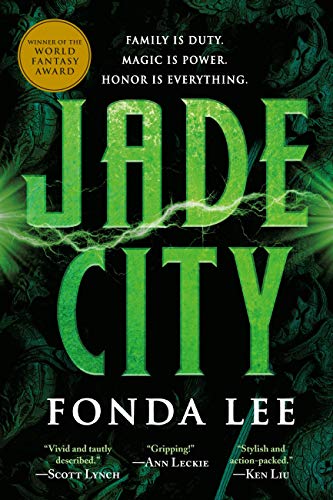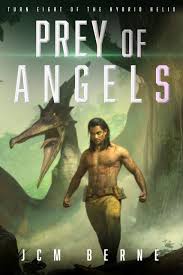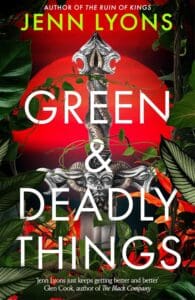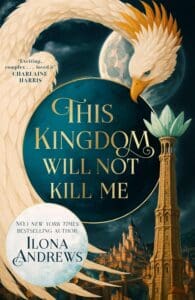Rating: 8.5/10
Synopsis
Jade is the lifeblood of the island of Kekon. It has been mined, traded, stolen, and killed for — and for centuries, honorable Green Bone warriors like the Kaul family have used it to enhance their magical abilities and defend the island from foreign invasion.
Now, the war is over and a new generation of Kauls vies for control of Kekon’s bustling capital city. They care about nothing but protecting their own, cornering the jade market, and defending the districts under their protection. Ancient tradition has little place in this rapidly changing nation.
When a powerful new drug emerges that lets anyone — even foreigners — wield jade, the simmering tension between the Kauls and the rival Ayt family erupts into open violence. The outcome of this clan war will determine the fate of all Green Bones — and of Kekon itself.
Review
“I’ll make an offer you can’t refuse”; those are the words echoed and mocked in so many movies. But they originated in a little book called “The Godfather” by Mario Puzzo in the late 60s and became a movie phenomenon. When I read “Jade City”, those words came to mind as this book is very much an organized crime novel. And if you add the touch of magic included in the story, from the Jade driven powers the characters have, it feels very much like gangster Urban fantasy.
As part of a trilogy (Jade War & Jade Legacy), Jade City feels like the book in the series setting up the world, the magic and the overall structure of the clans/rivalries. For some, this could be a negative since we’re spending a large chunk of the book in setup mode, but the world Lee builds is so rich in culture. Just understanding the consequences and possibilities of Jade powers is so crucial to enjoy the rest of the ride. I haven’t read yet the following tomes, but I have a feeling we’ll be spending more time in the conflicts and action of the Green Bone Saga world, since we’ve already experience the world building aspect of the series. The story is solid as it supports all this setting up through conflicts and meaningful dialogue versus exposing us to all this through dull exposition.
And where Jade City shines is in the organized crime exploration. This is such an unexplored genre. Just search for organized crime fiction on Amazon or Goodreads and you’ll find a fraction of any other subgenres (popular in the 60-70s but dwindled since then) — or Godfather and The Sicilian suggested as top reads. And Fonda Lee does such an amazing job in sinking us into a vibrant world of gangsters and institutions responsible for doing legit (or not so legit) business with the so-called Jade import/exports. If I had to put an exact date on how the book felt, it feels very 70s.
Finally, in this book it felt the fantasy part—or the Jade powered individuals and martial arts derived from using Jade—took a backseat in service of the war in between clans and characterization. Ultimately, it was necessary and an amazing approach to a fantasy book. We’re exposed to tons of magic systems in the genre and sometimes at the detriment of drama, but it was the opposite in Jade City. The fantasy served the story VS the other way around. Loved it.
If you’re a fan of Urban fantasy deeply set into a world of crime, gangsters and Jade-powered martial arts, Jade City and the following books of the trilogy will fall right into your TBR. Take Mario Puzzo, a dab of Jet Li and sprinkle it with magic and you’ll get exactly what this book is about. I am excited to continue the Jade journey through the following two books of the trilogy.





Leave a Reply